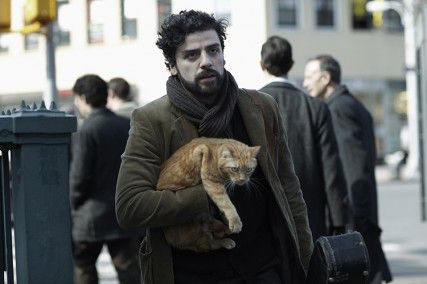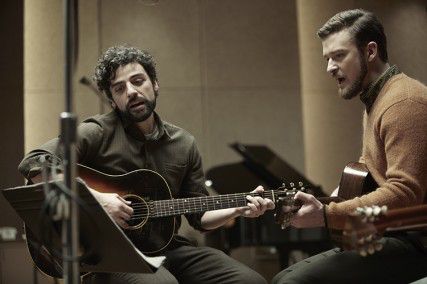
When Oscar Isaac agreed to take on the titular role in the Coen brothers’ newest film, Inside Llewyn Davis, he was prepared to literally walk in Llewyn’s shoes.
“I asked to have the shoes about a month before shooting because they were the saddest little shoes,” Isaac said in a round-table interview. “Like, a piece of leather wrapped around a foot with some rubber glued to the bottom.”
Despite a résumé packed with an impressive list of film and theatre credits, Isaac, like his character Llewyn, had often been relegated to supporting roles. Playing the hapless nobody Llewyn Davis helped Isaac find his voice as the guitar-toting, folk hero leading man.
And perhaps the only way for Isaac to have accessed Llewyn would be through his shoes: warm, easygoing Isaac — fidgeting in his seat at the table and initiating friendly back-and-forth in dulcet tones — bears no resemblance to the spiky, guarded musician on the big screen.
“It’s a very internal performance,” said Isaac. “I had to work on his physicality and how I wanted to express what was happening emotionally in an external way. So, for instance, I decided that [Llewyn] would always walk as if he was walking uphill.”
Isaac also did a lot of research to get a better idea of the ‘60s New York folk scene, reading Bob Dylan’s 2004 memoir, Chronicles: Volume One, as well as The Mayor of MacDougal Street, a 2005 posthumous memoir from folk singer Dave Van Ronk, on whom the world of Llewyn Davis is loosely based.
Fiercely committed to the role beyond research and footwear adjustments, Isaac was even willing to duke it out with the Coen brothers over certain creative aspects during shooting. However, Isaac said he soon figured out when to make compromises.
“I remember when we were doing hair tests,” he said. “I had seen some pictures of Dave Van Ronk and I liked this straight hair that he had. So I got together with a hair designer and he straightened it all. Then Joel and Ethan [Coen] came and looked at it and then Joel was like, ‘What do you think?’ And I said, ‘I don’t know, it’s not perfect, but I think it could work.’ And he says, ‘Okay, because I [expletive] hate it.’ And I was like, ‘Okay! Well, let’s not do it then. I’ll keep my Jew ‘fro.’”
Despite their rigidity on certain issues such as hairstyles, Isaac described the fluidity and lack of boundaries in the brothers’ directing style.
“They don’t say, ‘You need to act in this style,’” said Isaac. “They leave it open. That’s why [the Coen brothers] are kind of a phenomenon, because their tone is so specific but they’re not controlling you.”
Even without the steady hands of the Coen brothers at his back at all times, the ever-grateful Isaac insisted that he never forgot just how lucky he was to be a part of this film.
“I think just the fact that I was in a car with John Goodman was a pretty crazy thing in itself,” Isaac said reverently, referring to a scene in which the veteran actor and staple Coen brothers commodity gives Llewyn a ride from New York City to Chicago. “I remember when I turned around I was like, ‘I am definitely in a Coen brothers movie, man.’”

A 2005 graduate of the illustrious Julliard School with musical experience performing with The Blinking Underdogs, Isaac had not only the acting chops, but also the musical experience to really tap into Llewyn’s character.
“I was playing punk-ska at a time [when] that was starting to go away,” Isaac said. “So I did have to make a decision of ‘Why am I doing this? What’s more fulfilling to me as an artist at this point?’”
This kind of introspection resonates with Llewyn’s plight in the film.
“It’s farewell to that time and farewell to that strange moment in history right before the messiah comes, which is [Bob] Dylan,” said Isaac of the thematic elements of Llewyn Davis. “It is a bit like an apocalyptic film. This guy is wandering around in the end times right before the rapture happens.”
Yet with folk art, as with anything, the past is never truly divorced from the present. The nearly forgotten folk singer could one day become the subject of one of the most anticipated films of the year. The years spent toiling in the background and abandoning a musical dream could, one day, make a fine performer.
“That’s what a folk artist does,” Isaac said. “They get songs that are hundreds of years old and somehow make them relevant to the moment and to what’s happening in their own lives.”
This is an account occasionally used by the Daily Free Press editors to post archived posts from previous iterations of the site or otherwise for special circumstance publications. See authorship info on the byline at the top of the page.



